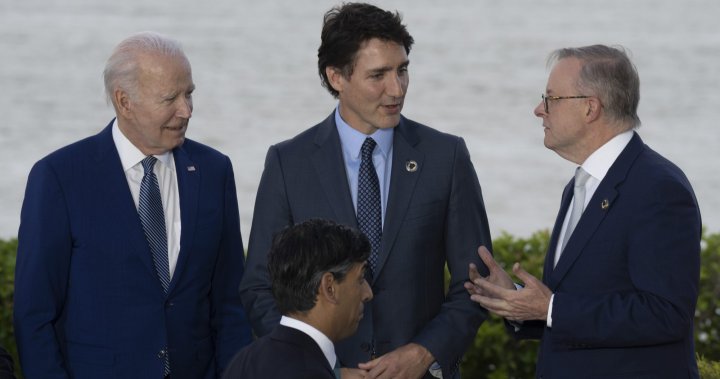Canada has been left out of the latest developments in the AUKUS security pact formed by the United States, the United Kingdom, and Australia to counter China’s influence in the Indo-Pacific region through military modernization. While Canada has expressed interest in potentially joining the alliance, AUKUS members have indicated that they do not plan to expand the pact beyond the core trio. The first phase of AUKUS focused on providing nuclear-powered submarines to Australia, with agreements in place for their construction and delivery in the 2030s. The second phase aims to enhance military technology cooperation in areas such as quantum computing, artificial intelligence, and cyber technology, with Japan being considered as a potential partner due to its technological strengths.
Despite Prime Minister Justin Trudeau’s indication that Canada is in discussions with AUKUS members about potential collaboration and membership, experts believe that Canada is unlikely to be invited to join the alliance. While Canada has announced a new defence policy update that includes increased spending on equipment such as submarines and helicopters, it still falls below NATO’s target of two percent of GDP for defence spending. The update also highlights the growing importance of cybersecurity and technological warfare in defending against threats from countries like China and Russia. However, Canada’s lack of military modernization compared to AUKUS members could hinder its ability to contribute as an equal partner.
AUKUS has emphasized the importance of engaging with international partners on specific projects and areas where collaboration can lead to technological innovation and promote peace and stability in the region. While Canada may collaborate closely with AUKUS in the future, experts believe that the country’s current defense capabilities may not align with the alliance’s modernization goals. As AUKUS members look to strengthen their military capabilities through advanced technologies, Canada’s procurement challenges and lower defense spending could limit its potential contribution to the alliance. The focus on Arctic security, cyberattacks, and the threat environment posed by hostile actors underscores the need for Canada to enhance its military capabilities to address evolving security challenges.
The exclusion of Canada from the AUKUS alliance may have implications for Ottawa’s strategic influence and partnerships in the region. While Canada has expressed a desire to participate in modern-minded alliances like AUKUS, the country’s perceived lack of contribution to military modernization efforts could impact its standing among allies. While the defense policy update highlights the government’s commitment to addressing cybersecurity and technological threats, Canada’s defense spending and procurement challenges may hinder its ability to keep pace with AUKUS members. The possibility of partnering with AUKUS on nuclear-powered submarines in the Arctic presents an opportunity for Canada to enhance its defense capabilities and potentially collaborate with the alliance in the future.
Overall, the AUKUS alliance’s focus on military modernization and technological innovation reflects the evolving security landscape in the Indo-Pacific region. While Canada has expressed interest in working with AUKUS members, experts believe that the country’s current defense capabilities and spending levels may not align with the alliance’s goals. As AUKUS continues to engage with international partners on collaborative projects, Canada may need to address its procurement challenges and increase defense spending to enhance its military capabilities and contribute effectively to regional security efforts. The exclusion from AUKUS highlights the importance of modernizing Canada’s defense capabilities to meet the evolving security challenges posed by hostile actors in cyberspace and beyond.


